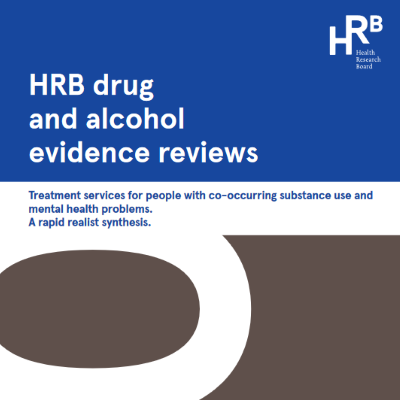Improving services for people with substance use and mental health problems
The Department of Health hosted an event today to highlight a HRB Evidence review which makes suggestions on how to reconfigure services to better meet the needs of of people with substance use and mental health problems.
3 min read - 25 Sep 2019

Brian Galvin, Programme Manager for Drug and Alcohol Research at the HRB Evidence Centre presented findings from the HRB evidence review called ‘Treatment services for people with co-occurring substance use and mental health problems: a rapid realist synthesis‘
‘There is good evidence that greater integration of mental health and addiction services leads to improved treatment outcomes, but that this integration is difficult to implement’, Mr Galvin said.
‘Integration is not a single concept related to a specific treatment or relationship among providers, but rather a complex, multifaceted portfolio of interrelated parts of a system’.
‘The aim of the HRB review was to understand what aspects of the integrative process made it more likely that better treatment outcomes would be achieved. In other words, how can we get an understanding of what works, for whom, in what circumstances so that the integration of services benefits the users of these services’?
Key findings in the report include:
- Providers’ belief that change is possible; and enthusiasm for implementing these changes serve as catalysts for the change that integrated care requires.
- A care system that works with the individual to establish a secure and stable environment makes engagement in treatment and recovery more likely. Purposefully building flexibility into treatment through co-design will help build the conditions necessary for recovery.
- Building a culture of hope among providers, family, and clients through instilling confidence, self-esteem, and empowerment is critical to recovery.
- Staff adoption of a client-centred approach and displays of kindness are associated with increased patient engagement. Other conditions that are associated with engagement are a supportive social network, progress in self-management behaviours, and stability in basic social and employment needs.
- Staff confidence and hope is also developed when training is delivered in an environment that supports co-production and values the knowledge of individuals with lived experience.
- When financial resources are applied in an empowering collaborative climate, formal partnerships can be developed across organisations and an open dialogue supporting a common language can develop. In this atmosphere, intermediary outcomes, such as unified case management, coordination of care, and shared treatment plans, are more likely to result and enable better integration of services.
The Minister of State with responsibility for Health Promotion and the National Drugs Strategy, Catherine Byrne TD, said
‘This evidence review is particularly important as it will give us a greater understanding of what works so that we can deliver better integrated mental health and addiction services leading to better outcomes for people with a dual diagnosis. The Department of Health has allocated funding of €1.5million funding for dual diagnosis services in 2019’.
Dr Darrin Morrissey, Chief Executive at the HRB adds,
‘This report clearly illustrates what research can bring to the table. It has the capacity to inform present and future services and help to ensure that people get the right care, in the right place, at the right time’.
The presentation slides are available to download.
This report is part of the HRB Drug and Alcohol Evidence Review series and was undertaken by a team from the Georgia Health Policy Center in the United States.
Download a copy of the report Treatment services for people with co-occurring substance use and mental health problems: a rapid realist synthesis from the Publications section of the HRB wesbite.
Read a Department of Health press release about the event.
3 min read - 25 Sep 2019



